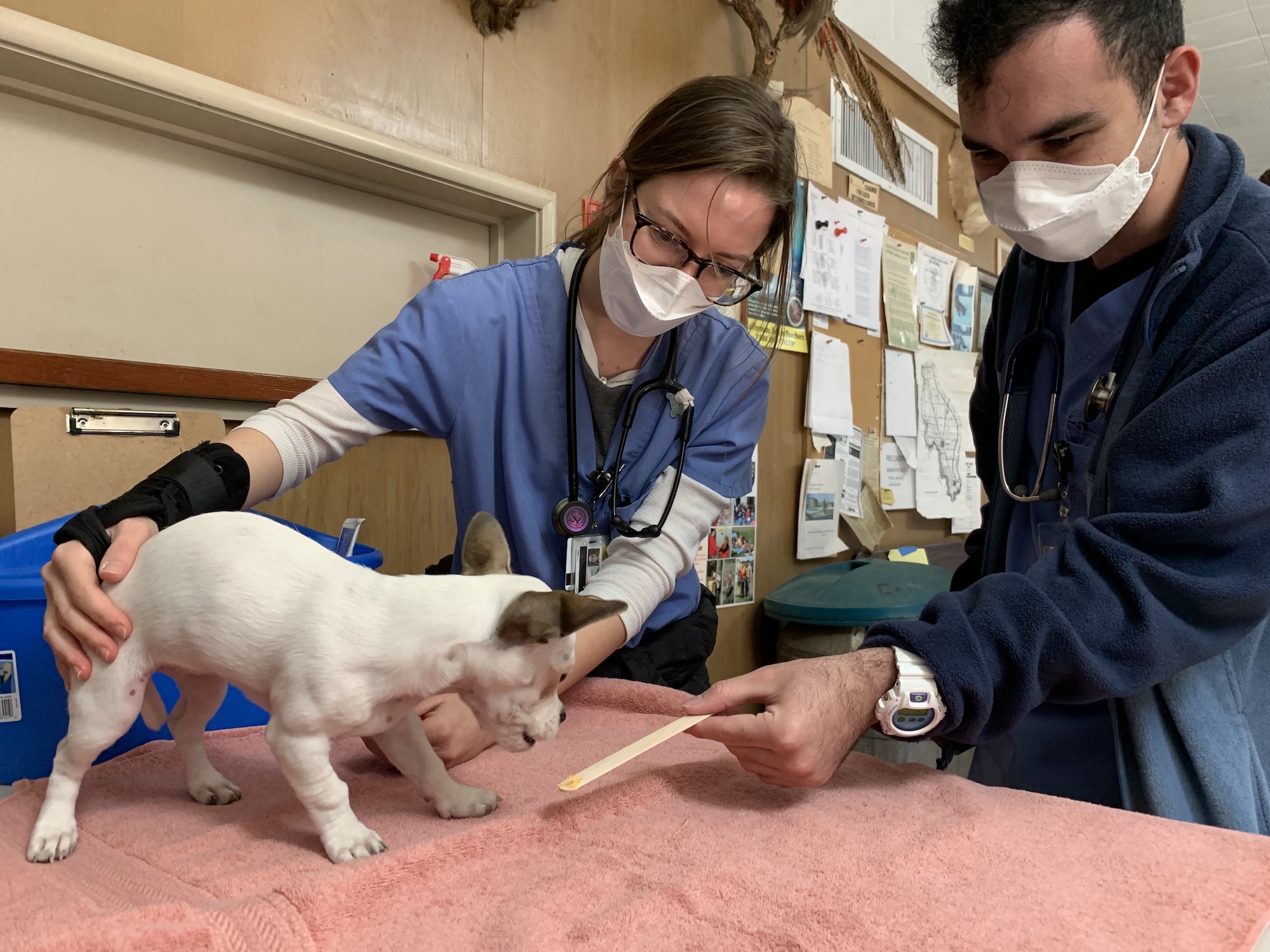
Connecting Health Care to People and Their Pets
About 1,000 people live in Knights Landing, California, a rural agricultural area in Yolo County. Because of its small size, the community lacks most services, including doctors and veterinarians - except on one Sunday every month. In this episode of Unfold, learn about the Knights Landing One Health Center, where veterinarians, physicians and their students team up to help some of the most vulnerable and underserved animals and people in the county.
In this episode:
Kristin Jankowski, faculty director, Knights Landing One Health Clinic and access-to-care chief at UC Davis School of Veterinary Medicine
Susan Adams, associate professor, Betty Irene Moore School of Nursing at UC Davis Health
Erik Olstad, assistant professor, UC Davis School of Veterinary Medicine
Tiaira Washington, nursing student, Betty Irene Moore School of Nursing at UC Davis Health
Sydney Rasmussen, nursing student, Betty Irene Moore School of Nursing at UC Davis Health
Izzie Hack, veterinary student, UC Davis School of Veterinary Medicine
Carlos Ayala, Knights Landing One Health client
Santos Lopez, Knights Landing One Health client
Stephanie Hernandez, Knights Landing One Health client
Clinics:
About Knights Landing One Health Center
School of Medicine Student Run Community Clinics
Translation services at the Knights Landing One Health Clinic are provided by bilingual students of the undergraduate Knights Landing class at the School of Veterinary Medicine
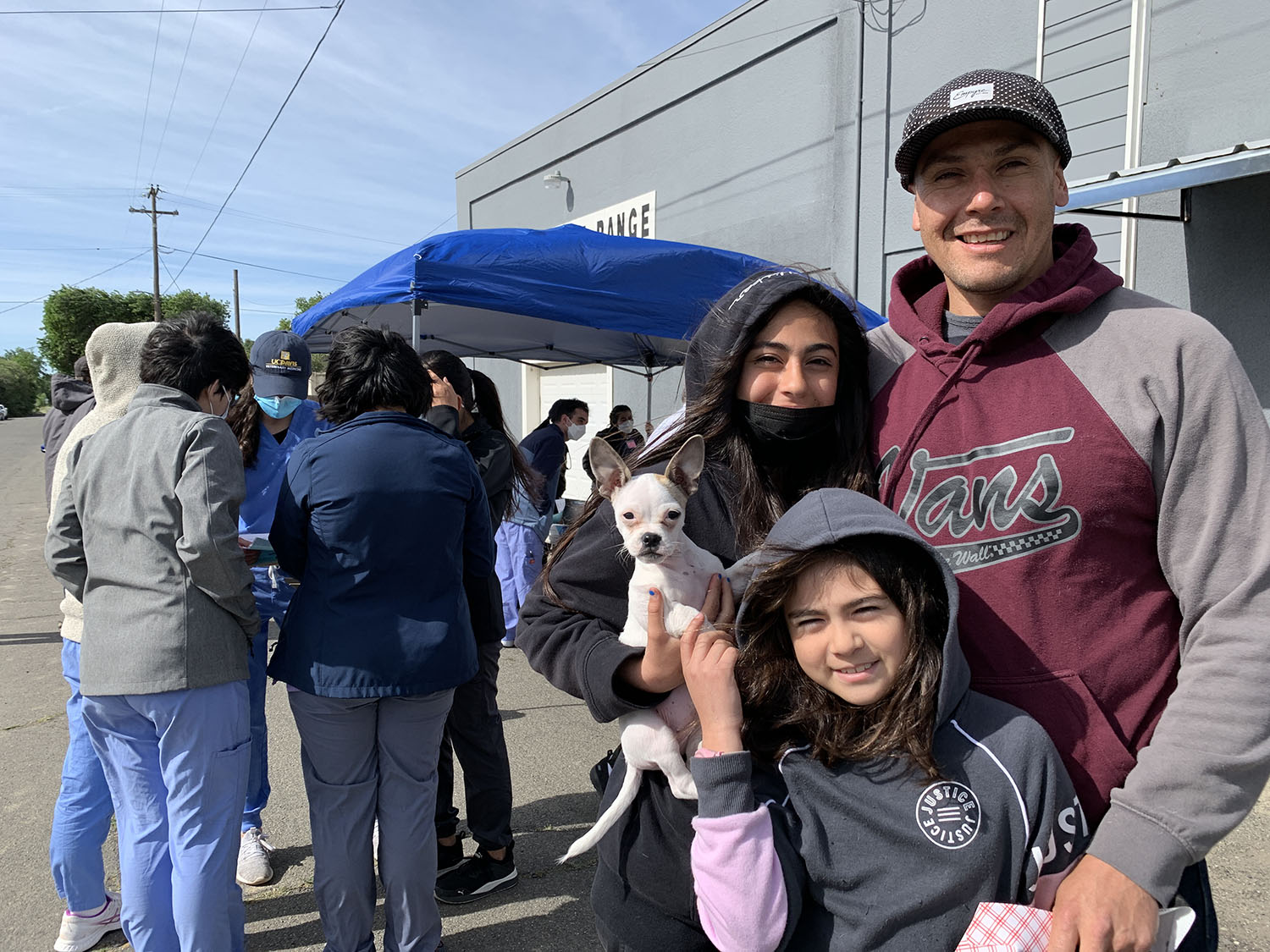
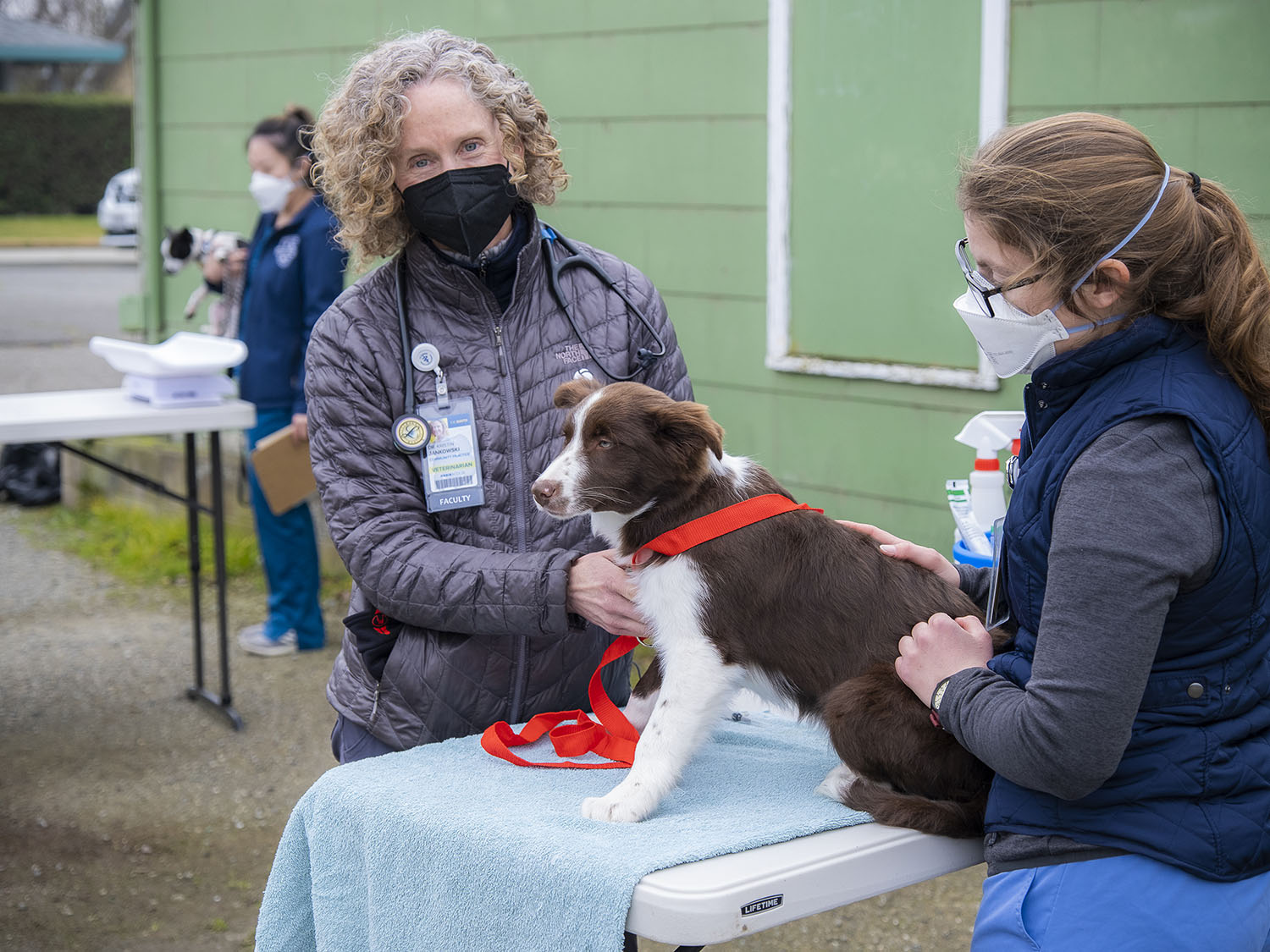
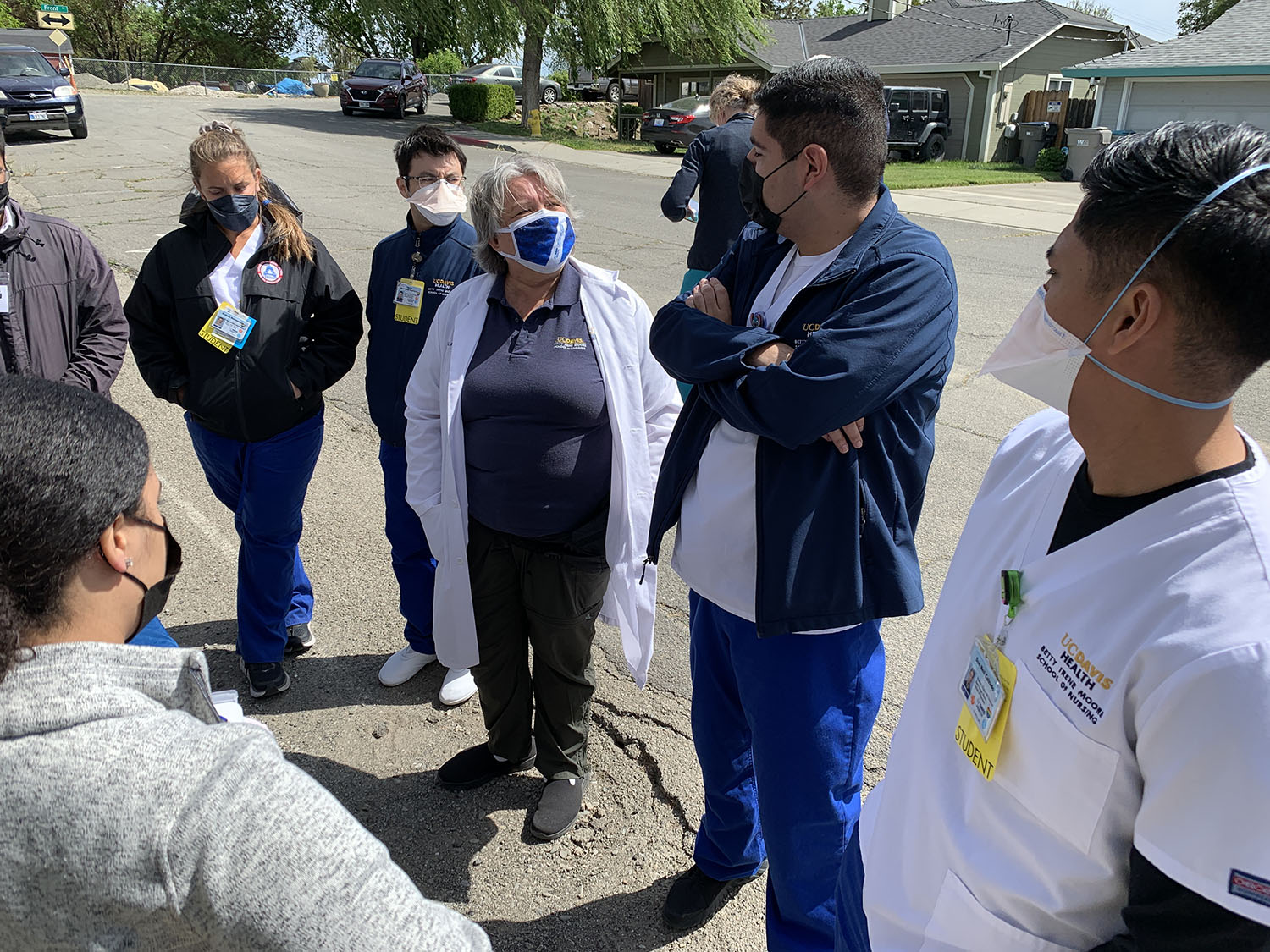
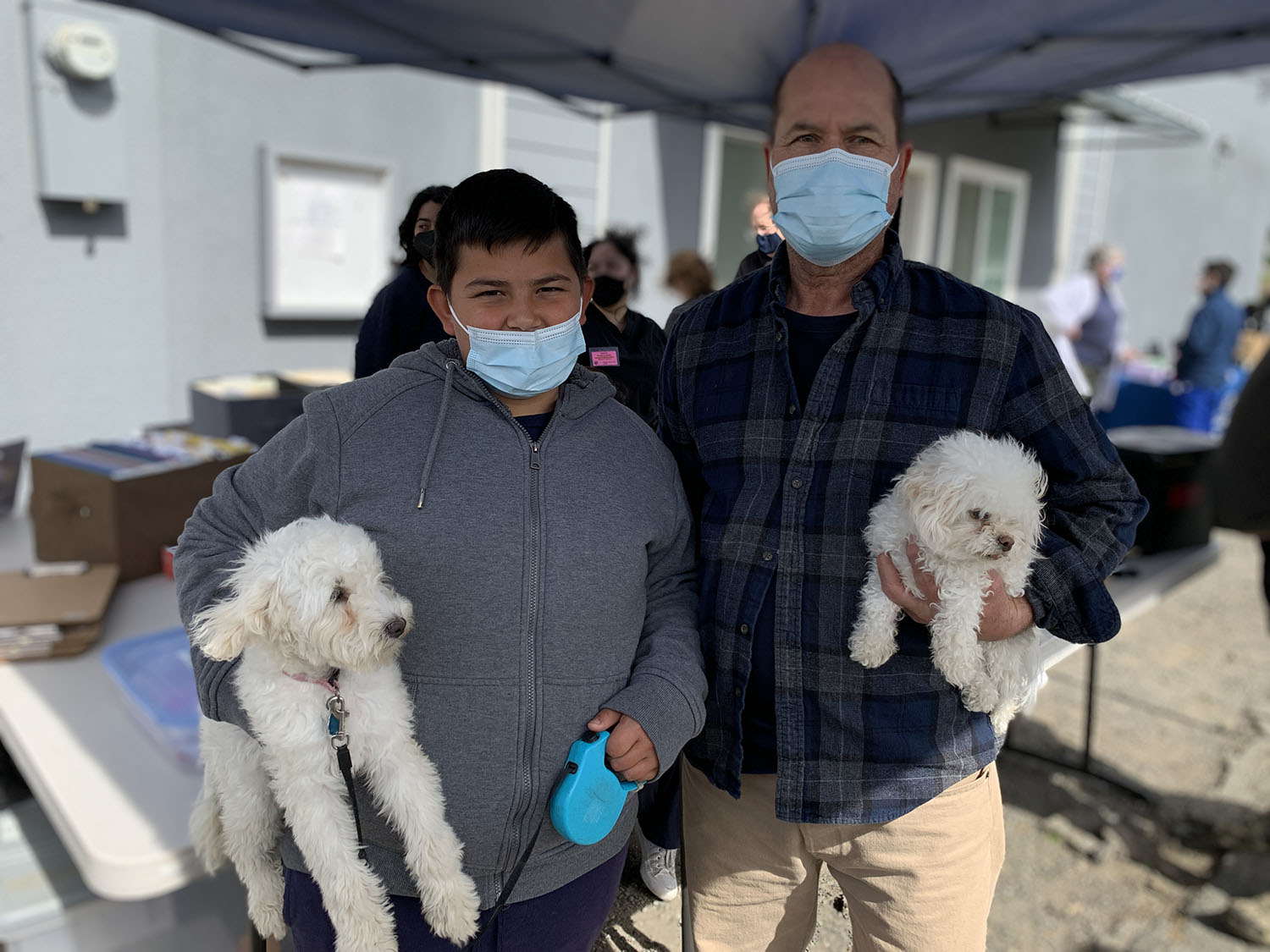
Transcript
Transcriptions may contain errors.
Amy Quinton
Coming to you from UC Davis
Marianne Russ Sharp
and UC Davis Health
Amy Quinton
This is unfold a podcast that breaks down complicated problems and unfolds curiosity-driven research. I'm Amy Quinton.
Marianne Russ Sharp
And I'm Marianne Russ sharp.
Amy Quinton
You've heard of the concept of One Health, Marianne. Yeah?
Marianne Russ Sharp
Yeah, the approach to health care that recognizes we're all connected right people, animals and our environment
Amy Quinton
We're going to look at how that unfolds on the ground.
Marianne Russ Sharp
I think its importance has been made very clear during the COVID pandemic.
Amy Quinton
You want to explain that a little more?
Marianne Russ Sharp
Yeah, so the virus that causes COVID is zoonotic, which means it can spread between people and animals. So in addition to infecting people, the virus has infected hundreds of animals, from dogs and cats to lions and gorillas, you've probably seen the stories about animals in zoos,
Amy Quinton
Right, and there's evidence to suggest that COVID-19 began at a wet market, where wild animals and people come into contact with one another. And potentially the virus may have jumped from an animal to a person.
Marianne Russ Sharp
So we need a collaborative approach to health looking at animals, people and the environment together a more holistic approach.
Amy Quinton
And One Health is not just a way to improve health globally, but locally as well. In fact, this is put into practice in a small community in Yolo County, California, a place called Knights Landing,
Marianne Russ Sharp
Right the Knights Landing One Health Center. It provides medical care to people and veterinary care for animals.
Amy Quinton
UC Davis and UC Davis Health faculty and students volunteer their time to provide care for this underserved community. And I got to tag along earlier this year when vet students and nursing students were helping out.
Marianne Russ Sharp
And now we're going to hear what a typical clinic Sunday is like.
Amy Quinton
Every third Sunday of the month, dozens of students transform what's normally a hunting club into a makeshift veterinary clinic in Knights Landing. They're from the School of Veterinary Medicine and the Betty Irene Moore School of Nursing.
Kristin Jankowski
We have it on Sundays specifically because we're serving a community of mostly agricultural workers who that's their only day off of the week is Sundays.
Amy Quinton
Veterinarian Kristin Jankowski is Faculty Director for the Knights Landing One Health Clinic.
Kristin Jankowski
So the students are great enough to not mind getting up very early unloading a large volume of supplies from a shed.
Amy Quinton
It's organized chaos and highly efficient. Students from the School of Veterinary Medicine dressed in blue scrubs set up a pharmacy, exam tables, scales, computers, even large camping tents so vets can care for skittish cats, without too many distractions. The whole thing takes 45 minutes. Outside, Jankowski greets one of the first clients of the day. Hi, Darling, who is this?
Carlos Ayala
Her name is Chica.
Kristin Jankowski
Oh, hello Chica. You are so sweet.
Amy Quinton
Carlos Ayala and his young daughters brought Chica, their little five-pound puppy who is shivering in the wind.
Carlos Ayala
She is a chug. She's a chug. Chihuahua and a pug.
Kristin Jankowski
You guys have an appointment or are you..
Carlos Ayala
At nine.
Kristin Jankowski
At nine, Awesome.
Carlos Ayala
She's gonna get her first vaccines.
Kristin Jankowski
Oh, exciting. Okay, awesome. So then I'm guessing they're writing up. . . (fades out)
Amy Quinton
Carlos says he's never been to the clinic before but is glad it's here.
Carlos Ayala
Well, this is our first dog or my first dog. So I'm just getting introduced to all of this, making sure she's fine and doing well. So this is my first time. I heard around the community that they're going to be here and it's home. So we don't have to travel that far.
Amy Quinton
Fewer than 1000 people live in this tiny agricultural community nestled in the Sacramento Valley. There aren't a lot of businesses and many of left including health care providers.
Kristin Jankowski
Knights Landing used to have a human medical facility that then left the area. The Med School was asked to come in and bring a student group to run a student run clinic on the human med side.
Amy Quinton
Jankowski is talking about the free community health clinic run by School of Medicine students also in Knights Landing. That was established in 2011.
Kristin Jankowski
Then in 2013, the folks attending that human medical care clinic started to express that hey, we have pets, and we don't have care options for them either. Would there be any way you could help?
Amy Quinton
The help they provide to this underserved community is free. About a quarter of Knights Landing residents live in poverty? Median household income is around $37,000. At an exam table, Carlos Ayala meets with second year vet student Izzy Hack and veterinarian Erik Olstad.
Izzie Hack
Any concerns for her at all?
Carlos Ayala
No. No. None at all.
Izzie Hack
That's what we like to hear.
Carlos Ayala
Ya know, she seems very happy.
Erik Olstad
She looks great. I would absolutely advocate getting her spayed at some point though unless you are planning on breeding her.
Amy Quinton
In addition to clients learning how to care for their animals, vet students are also learning how to interact with clients and ask the right questions.
Erik Olstad
What vaccines do you want to give today?
Izzie Hack
Rabies, Distemper, Parvo?
Erik Olstad
Yep, how's this gonna go? So we give the rabies, when do I need to give that again?
Izzie Hack
One year
Erik Olstad
Perfect.
Amy Quinton
A lot of the clinic's attention is focused on preventative medicine, such as vaccines as Jankowski.
Kristin Jankowski
We see a lot of skin disease. We see a lot of ear and eye disease because those things are common as well. And we do see some infectious disease. We work hard to prevent transmissible infectious disease to people that's termed zoonotic disease. That can be anything from diseases that we normally are vaccinating for, to parasites that we're trying to help the families prevent in their pets so it doesn't transfer to people.
Amy Quinton
Outside Stephanie Hernandez also came to get vaccines for her two large Huskies. One husky is the mother and the other is her 11-month-old pup Oso, who is making it known that he doesn't like being separated from mom.
Vet student
So this is his rabies tag, I'll put it in a bag so you don't lose it and then this first. . .(dog barks) I know. Hey. Hey. This first one is heart guard.
Amy Quinton
it's not Stephanie's first time at the clinic. She says she wouldn't have many options for veterinary care if the clinic weren't here.
Stephanie Hernandez
I come here because it's really close and my mom doesn't know how to drive. So it like it helps us a lot with them coming out here and providing these vaccines for the dogs.
Amy Quinton
While vet students care for the animals, nursing students care for the people. The students play an important role here, says Associate Professor Susan Adams with the Betty Irene Moore School of Nursing who advises them.
Susan Adams
What we've been finding is that there are a lot of people, especially in underserved areas, especially with people who may be lower income that sometimes they'll get the care for their animals before they get the care for themselves. And it's an opportunity for us to connect with the community and through their animal, talk to them about their own health practices.
Amy Quinton
That's exactly what nursing student Tiara Washington did. This was her first time volunteering at the One Health Clinic.
Tiara Washington
So I followed one patient who brought her cat in because the cat hurt his leg. So I got to like take her outside and bring her to the table and talk to her about her COVID status and like get her blood sugar checked and her blood pressure checked and those kinds of things are like you don't really get them done unless you go to a doctor's appointment and not everyone has the opportunity.
Amy Quinton
A lot of people that show up may not realize they need care, says Susan Adams
Susan Adams
In the past, we've picked up people with diabetes, hypertension, pretty serious postpartum depression, and people that have a lot of misinformation about COVID and about vaccination. So it gives us an opportunity to perhaps engage more of the community in the importance of being vaccinated.
Amy Quinton
Getting people to care they need isn't always easy. There are cultural and language barriers. Many people who come to the clinic speak Spanish. But UC Davis Chicano Studies students also volunteer their time to help translate.** Santos Lopez and his son Jonathan brought their little white poodle mixes Popeye and Olivia for checkups. Santos says they've visited this clinic more than once with their dogs,
Santos Lopez
(Speaking in Spanish.)
Amy Quinton
He says if the clinic didn't exist, it wouldn't be good because animals need vaccines. And a lot of people don't have a way to pay for them. But we can bring them here and that way our animals are healthy. That includes Popeye and Olivia who are being examined by first year vet student Taylor Traxler.
Taylor Traxler
And then how are they doing overall health wise any problems at home any coughing, sneezing, vomiting, diarrhea, things like that?
Amy Quinton
While vet students examined the dogs, nursing students Sydney Rasmussen talks to Santos's son Jonathan Lopez.
Sydney Rasmussen
What's your favorite fruit?
Johnathon Lopez
My favorite fruit is an orange
Sydney Rasmussen
An orange! What's your favorite sport?
Johnathon Lopez
Basketball, football,
Sydney Rasmussen
Football is fun. You wear your helmet, right?
Amy Quinton
It sounds like a casual conversation. But Rasmussen says she's really trying to assess his health habits.
Sydney Rasmussen
It kind of gives you a little bit of insight into what a day in their life looks like. So sports, you know, do you wear a helmet? Is that something, a mouth guard, things that maybe they don't always think about but or the importance of it and if they do wear it and the benefits of that or boxing, you know, have you ever lost consciousness with that? Sometimes I think kids have a lot of fun. They don't, they don't always know sometimes parents don't always know what's going on. So I'm just here to just talk and get to know get to know people.
Amy Quinton
Veterinarian Erik Olstad says this holistic approach is important because it gives more people access to care.
Erik Olstad
Just because I'm a vet, doesn't mean I don't care about the human attached to that pet. I think this is a really cool model to look at for these types of clinics, and even for clinics in general, to tie these health subjects together, you know, cats get diabetes, and so do people. Dogs get arthritis but so do people. So it's kind of neat that we can have the same conversation for two different species in the same room.
Amy Quinton
By noon, when the clinic begins to wind down, veterinarians, nurses and students have provided care for more than 30 animals and people. Jankowski, who pours her heart and soul into this work is exhausted, but elated.
Kristin Jankowski
I just love it. And I just love coming here. It is, it's very refreshing to be able to make a direct impact and be able to help a community that really appreciates and deserves such fantastic care. They they have these pets that are a part of their lives and it's I feel it's just a wonderful gift that we can give to listen to what they need and respond.
Marianne Russ Sharp
Amy this clinic sounds pretty unique, especially given that it's run by veterinary and nursing students. I think you mentioned that veterinary care for the clinic began back in 2013. Was this the first UC Davis student run vet clinic in an underserved community.
Amy Quinton
It wasn't the first one, way back in 1992 students and community members in Sacramento opened a clinic for pets of people experiencing homelessness. And that expanded into another clinic and Davis and then into Knights Landing. And two to three times a year vet students also travel to a community called Covello up in northern Mendocino County. Each weekend, they provide about 100 spay neuter surgeries for animals in addition to health checkups.
Marianne Russ Sharp
Wow, that's a lot of surgeries in one weekend.
Amy Quinton
It is
Marianne Russ Sharp
wow. And you know UC Davis Health also offers a number of student run medical clinics in underserved communities in the Sacramento area. Under physician supervision School of Medicine students offer care to the Asian South Asian, Latino, African American Muslim Filipino communities and more, as well as those experiencing homelessness.
Amy Quinton
It's all part of a very important holistic One Health approach to caring for the community. I think.
Marianne Russ Sharp
I agree. You can find a lot more information and links to all of these clinics on our unfold website. That's uc davis.edu/unfold.
Amy Quinton
And there you'll also find photos for my visit to the Knights Landing clinic and listen to more episodes of unfold as well. I'm Amy Quinton.
Marianne Russ Sharp
And I'm Marianne Russ Sharp. Thanks for listening.
Amy Quinton
Unfold is a production of UC Davis. Original Music for unfold comes from Damien Verrett and Curtis Jerome Haynes. Additional music comes from Blue Dot Sessions.
Marianne Russ Sharp
if you like Unfold, leave us a review because reviews can help more people like you find our show and enjoy it. So write your review on Apple podcasts or leave a rating for us on Spotify or anywhere you listen to podcasts. Thanks for helping this show grow.
Amy Quinton
If you like this podcast check out UC Davis's other podcasts the Backdrop. It's a monthly interview program featuring conversations with UC Davis scholars and researchers working in the social sciences, humanities, arts and culture. Hosted by public radio veteran Soterios Johnson, the conversations feature new work and expertise on a trending topic in the news. Subscribe wherever you get your podcasts.
** Clarification: Translation services are provided by bilingual students of the undergraduate Knights Landing class at the School of Veterinary Medicine